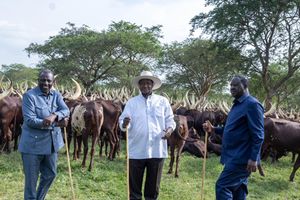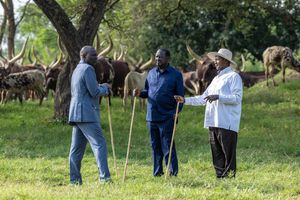
President William Ruto (left) and opposition leader Raila Odinga in Kisozi, Uganda, on February 26, 2024.
In 43 BC, Julius Caesar was proclaimed “the Father of his Country (Rome) and chosen dictator for life” after defeating Pompey t in the civil war.
In February 44 BC, Caesar publicly refused the diadem of kingship presented to him by Mark Antony. And a month later, Caesar was assassinated by about 40 Roman senators on the “ides of March” (March 15).
The February-March period has become a season of political deal-making. This rings true of Kenya. The February-March hiatus is a season of elite wheeler-dealing that routinely culminates in a power-sharing, popularly known as ‘the handshake,’ which ends the orgy of violent protests, deaths and destruction of property after every election in Kenya. Six years ago, I argued in this column that “Conciliator handshake is Africa's most successful political idea” (Sunday Nation, May 12, 2018).
On February 28, 2008, President Mwai Kibaki and opposition leader Raila Odinga signed a power-sharing deal to end Kenya’s worst post-election violence. As if to commemorate Kenya’s ‘Deal-Making Day’ on February 28, President William Ruto and Raila walked together donning blue Kaunda suits in a public display of their newfound camaraderie.
The day before, Kenyans were struck mute by a widely circulated picture of Uganda President Yoweri Museveni, President Ruto, and Raila schmoozing while grazing Ankole cows at Museveni's Kisozi country home. The blissful walk and schmoozing trio exuded the same “power of the picture” as earlier handshakes.
This first in a series of articles on the dynamics and impact of “the power of a Handshake in Kenya’s Democratic Recession” takes a reflective look at the footprint of the Odingas in elite power deals in Kenya.
For over seven decades since he stormed Kenya’s political scene as a member of the Kenya African Union from 1948, an elected member of the Legislative Council from 1957 and Kenya’s first VP after 1964, Jaramogi Oginga Odinga and his scions have shaped the ebb and flow of high-end elite deal-making in Kenya. Collectively, the Odingas have indisputably become the consummate political deal-making family.
The Odingas are enchanted as doyens of the Kenyan opposition. But their most enduring legacy in the culture of politics in Kenya is the “handshake”. Tanzania’s peace and stability can be attributed to the hegemonic power of its dominant party, Chama Cha Mapinduzi.
Since Kenya’s return to multi-party politics in 1992, the Odingas have perfected the art of post-election wheeling and dealing. By hook or crook, they have managed to share power with all five presidents of Kenya: Daniel arap Moi, Mwai Kibaki, Uhuru Kenyatta and now William Ruto.
In one way or the other, the Odingas have been involved in the eight “handshakes” that have shaped the culture of politics in Kenya.
Four months before independence in 1963, Prime Minister Jomo Kenyatta drove to Nakuru for a meeting with a wary the white settler community. In modern Kenya’s first power deal, he extended an olive branch to the settlers, offering them the option to remain and continue owning land and farming in Kenya.
Disagreements over land policy during the transfer of power formed a fundamental reason for Odinga’s fallout with Kenyatta, leading to his resignation as Vice-President in 1966.
The second power deal took place after the Kenya African National Union (Kanu) won the first general election in 1963.
The opposition Kenya African Democratic Union dissolved itself voluntarily after a power deal in 1964 that enabled opposition leaders to joined Kanu after a strong lobbying by Tom Mboya to neutralise Odinga and populists in the ruling party. As a response to Odinga’s opposition to the letter and spirit of the two handshakes, the government maneuvered him out of power till 1992.
The third 'handshake” followed the 1992 multi-party elections. Moi who lost control of parliament after garnering 100 out of 188 seats struck a quiet and short-lived deal with senior Odinga’s FORD-Kenya which had won 31 seats. Together with 12 nominated seats, Moi secured a super-majority of 143 in a 200-member Parliament. Odinga likened Moi to "a giraffe with a long neck that sees very far".
After Jaramogi’s demise in 1994, his heir, Raila, moved the art of post-election deal-making to a whole new level of perfection. In the aftermath of the 1997 elections, Raila struck a power-sharing deal Moi who had 107 seats and lost control of the 210-member parliament.
Kenya’s fourth handshake gave Moi 21 House seats that Raila’s National Development Party controlled, enabling the president to counter-balance the Kibaki-led opposition.
A power deal between Raila and Kibaki ed Kenya’s worst post-election violence that left over a thousand people dead, displaced over 600,000 people and destroyed property worth billions. The National Accord and Reconciliation Act (2008) created the position of Prime Minister for Odinga but also paved the way for sweeping reforms, including the promulgation of the 2010 Constitution.
The Odingas were the target of the sixth handshake between Uhuru Kenyatta and William Ruto, which enabled the duo to form the Jubilee Coalition and win the March 4, 2013 election. With its ‘tyranny of numbers,’ the Jubilee Coalition shunned another post-election handshake opting to govern with a thin parliamentary majority. This ushered five years of fierce street protests.
After turbulent double-elections in August 8 and October 26, 2017, Jubilee Party won super majority in both Houses of Parliament: 34 of the 67 seats in Senate and 171 of the 341 seats in the National Assembly. But against the Odinga-led violent protests, President Kenyatta succumbed to a power-sharing deal with Raila on March 9, 2018.
Kenya’s seventh handshake calmed the nation but led to a dramatic falling out between Kenyatta and Ruto and set off disintegration of the Jubilee Party. Arguably, the deal with Odinga was Uhuru’s strategy to win Odinga’s support to pass bills in Parliament in the 2017-2022 period and to avoid impeachment by a Ruto-dominated Jubilee rank and file.
In May 2022, three months to the presidential poll, I penned an article: “Can Kenya escape a Raila-Ruto handshake after polls? (Sunday Nation, May 8, 2022). Few, not even Ruto himself, imagined a Ruto-Odinga power deal.
Prof Peter Kagwanja is the CEO at the Africa Policy Institute, Adjunct Professor University of Nairobi & Visiting Scholar at the National Defence University-Kenya.










